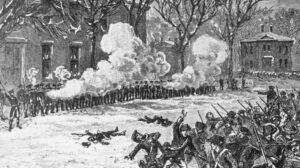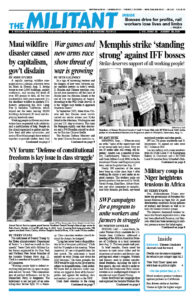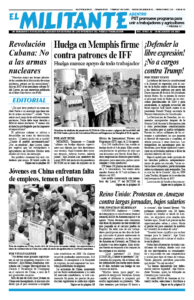The indictment of Donald Trump by the Biden administration’s Department of Justice “is a head-on assault on free speech,” Steve Clark told a Militant Labor Forum organized by the New York and Northern New Jersey branches of the Socialist Workers Party Aug. 12. Clark is a member of the party’s National Committee.
“Working people fight to defend everything that provides us space to organize and act,” he said. “The criminalization of political differences, led by the Democratic Party, is dangerous. The indictment is not just part of an intra-ruling-class faction fight. It’s a frame-up. Class-conscious workers should demand the charges be dropped.”
“Lying has never been a disqualification to be a bourgeois politician,” Clark told the 55 people at the meeting. “More important, it’s not a disqualification for free speech. The indictment is based entirely on what Trump said about the 2020 elections.” On those grounds, the SWP would be high on the list of parties subject to disqualification, Clark added. We know that all elections under capitalism are rigged in favor of the bosses’ parties and against the working class and workers’ parties such as the SWP.
Clark drew attention to the ruling by Judge Thomas Griesa in the SWP’s landmark federal lawsuit against decades of FBI spying and harassment. In a victory for all working people, Griesa ruled in 1986 that government spying on the SWP was unconstitutional.
Acknowledging that the SWP is a revolutionary organization, Griesa said that government informers had never produced a shred of evidence the party engages in espionage, violence or terrorism.
“The evidence does show in considerable detail the nature of the SWP’s actual, lawful activities,” which, the judge added, it “has a clear constitutional right to carry out.” Clark urged participants to read Griesa’s ruling, along with trial testimony by SWP National Secretary Jack Barnes and former National Secretary Farrell Dobbs in FBI on Trial: The Victory in the Socialist Workers Party Suit Against Government Spying, published by Pathfinder Press.
Days after the forum, Democrats took the assault on constitutional freedoms another step. A grand jury in Georgia indicted Trump and 18 others Aug. 14 for racketeering, conspiracy, making false statements and other charges. The Racketeer Influenced and Corrupt Organizations Act, purportedly enacted to combat the mafia, has been widely used to target unions.
The SWP’s defense of free speech is nothing new, Clark said. Leon Trotsky, a leader of the Bolshevik Revolution in Russia, explained in 1939 that all suppression of rights, no matter who the target, comes down on the working class. That is a “law of history,” Trotsky said.
Clark also cited SWP leader James P. Cannon’s response when New York City authorities banned a Nazi rally in 1960. “Our line is free speech. We have to fight for it and convince other people we mean it,” Cannon wrote. “As the class struggle develops, we will have to fight the fascists, and not only with words.” But this won’t be a fight to deprive them of the right to speak. It will be “a defensive fight to prevent them from interfering with the rights of workers.”
New York Times columnist Thomas Edsall recently pointed to liberals’ increasingly open hostility toward the First Amendment. But Edsall’s claim that liberals have historically been the staunchest defenders of free speech is false, Clark said. Among the prominent examples he cited was Judge Griesa, a conservative Republican and Nixon appointee, who ruled for the SWP against the FBI.
John Studer, the Militant’s editor, recalled from the audience that it was Democratic President Franklin Roosevelt who remade the FBI into a political police force targeting militant workers, Black rights fighters, opponents of Washington’s wars and SWP members.
At the forum were two people who had joined a solidarity brigade that had traveled from Puerto Rico to Cuba last year. On their return 60 brigadistas were interrogated by the FBI. “None of them talked to the FBI,” one of the trip participants reported.
Throughout modern history, Clark said, attacks on political rights have accompanied steps toward war by the rulers, such as we’re seeing again today. Moscow’s 18-month war against Ukraine’s sovereignty and independence is accelerating tensions between capitalist powers. In response to large-scale joint naval exercises off Alaska’s Aleutian Islands by Moscow and Beijing, Washington deployed warships and aircraft to track the vessels. Especially in such volatile times, the imperialist rulers tighten the screws on free speech and political activity.
A dangerous threat to rights was advanced in a recent New York Times article, “Rich U.S. Leftist Linked to Web of Global Chinese Propaganda,” Clark said. It fingers individuals linked with the People’s Forum, Codepink, and other groups for alleged violations of the Foreign Agents Registration Act. A statement condemning the attack by Róger Calero, SWP candidate for New York City Council, appears in this issue.
A road to unify the working class
Constitutional rights are also at the center of the June 29 Supreme Court ruling overturning two university admissions programs, Clark said.
“The mass struggle for Black rights, the anti-Vietnam War movement and resistance among workers in coal, rail, steel and packinghouses opened the door to winning affirmative action,” Clark said. In 1974 a consent decree pressed by the United Steelworkers union set hiring goals in basic steel for Blacks, women, and Latinos, helping overcome divisions and strengthen that union and others.
As the labor movement retreated over the next few decades, however, affirmative action was “substantially corrupted into a tool of capitalist division benefiting the most privileged layers,” Clark noted, citing SWP leader Jack Barnes from the book Are They Rich Because They’re Smart? Class, Privilege, and Learning under Capitalism.
“Rights that mark true progress for the working class are color blind,” Clark said. It took the Civil War and Radical Reconstruction to uproot slavery and win the 14th Amendment. No state, that amendment says, shall “deny to any person within its jurisdiction the equal protection of the laws.”
“Our society is not, and has never been colorblind,” writes Justice Clarence Thomas in a concurring opinion on the Supreme Court ruling. “But under the Fourteenth Amendment, the law must disregard all racial distinctions.” Thomas recounts how the court abandoned that constitutional protection in its 1896 Plessy v. Ferguson ruling, providing legal cover to racist segregation. As a result, Thomas said, “even the promise” of the 14th Amendment “took time to materialize.”
“But it wasn’t ‘time’ that tore down Jim Crow,” Clark said. “It was class struggle. You won’t find a description of that in any of the justices’ opinions.” He described the SWP’s participation in those battles, from building the industrial unions in the 1930s and ’40s that started breaking down segregation, to the Montgomery bus boycott and other fights that marked the proletarian movement for civil rights in the 1950s and ’60s.
In a dissenting opinion, Justice Ketanji Jackson Brown says the ruling values racial diversity “in the [military] bunker, not the boardroom.” Her comments highlight the upper-middle-class and professional aspirations of the layers she speaks for, Clark said. In contrast, Thomas says the Harvard and similar admissions programs are “a call to empower privileged elites” in “a world in which everyone is defined by their skin color.”

Working people have an opposing starting point. Bourgeois revolutions cleared the path for the working-class movement. Democratic republics and universal suffrage enabled labor “to achieve its present unity and solidarity,” said Bolshevik leader V.I. Lenin in 1919, for “waging a systematic struggle against capital.” Without this, “this development of the working class would have been impossible.” Constitutional protections won by farmers and mechanics during the First American Revolution, and then by toiling producers of all skin colors during the Second, are what the SWP defends today.
But a bourgeois republic remains “a machine for the suppression of some people by others,” Lenin added. “As long as there is exploitation there cannot be equality.” Real protection, Clark said, comes from using political space to fight for a revolution that can bring the working class and its allies to power.
Caliber of Cuban leadership
The historic accomplishments of the leadership forged by Fidel Castro are recounted in Joseph Hansen’s Dynamics of the Cuban Revolution and the SWP’s 2022 political resolution, reprinted in The Low Point of Labor Resistance Is Behind Us: The Socialist Workers Party Looks Forward, Clark said. The proletarian and internationalist course that Castro led “did not simply transform the lives, conditions, and political consciousness of workers and farmers in Cuba,” the resolution explains. “It opened a renewal of communist leadership in the Americas, in the United States and beyond.”
Hansen described the caliber of the revolutionists of action — that’s what he called them, revolutionists of action — who led workers and farmers in Cuba to conquer power in the face of the most powerful ruling class in history. “I was taught that important as books are and for all the time that must be put into mastering them,” Hansen wrote, “what is decisive is the revolution itself.”
“Workers learn through fighting, gaining unity and class consciousness,” Clark said. “So we can take the next necessary steps — breaking with the bosses’ Democratic and Republican parties and building a labor party based on the unions.”
The program and continuity of the Socialist Workers Party point the necessary way forward for the working class in the U.S., as part of the world struggle for socialism. “You can’t wait for a revolutionary situation to build a proletarian party.
“That’s the lesson of the assault Castro led on the Moncada garrison in Santiago de Cuba in 1953,” Clark added. Despite failing to take the garrison, that battle opened Cuba’s revolutionary war leading to the conquest of power by workers and farmers just six years later.
Clark urged participants to join SWP members defending constitutional protections, building support for union struggles and organizing opposition to the U.S. rulers’ economic war on Cuba. “And above all, forging a working-class party that can and will lead tens of millions to make the American socialist revolution.”


